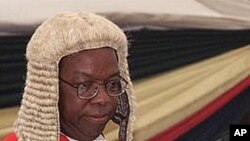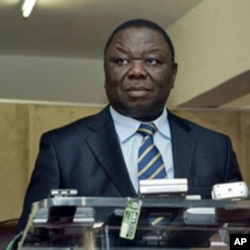Zimbabwe Chief Justice Godfrey Chidyausiku last week warned the executive to desist from trying to interfere with the judiciary. Judge Chidyausiku’s remarks, at the opening of the 2011 legal calendar, has caused concern in Zimbabwe’s legal fraternity as many say the public does not regard higher court judges as impartial.
Lawyers say Judge Chidyausiku’s remarks about judicial independence are controversial because in their view the independence of the judges has been severely compromised in the past decade. They cite a number of issues including appointments of judges well-disposed to President Robert Mugabe and his ZANU-PF party, and defiance of court orders.
But in particular they say judicial officers have been compromised by being granted fully equipped, profitable, and tax-free farms since Mr. Mugabe began awarding white-owned farms to ZANU-PF supporters in 2000.
Zimbabwe lawyer Arnold Tsunga is also director of the International Commission of Jurists’ Africa program. He says right from the start it was clear the dispossession of the farms would be contested in the courts.
"When the Government of Zimbabwe expropriated these farms, it did so without compensation and it took over farms without consent of owners, so you find it is disputed land that must be subject to judicial arbitration," said Tsunga.
Tsunga says the free distribution of productive farms, including improvements and equipment, damaged the independence and impartiality of the bench.
"It is very consistent with the strategy of beginning to give them assets, disputed assets, like expropriated land," he said. "So all this was a consistent strategy to undermine the independence of bench."
Since 2002, when the previous chief justice and some of his colleagues resigned after being threatened by Mr. Mugabe’s supporters, all but one judge of the Supreme Court, which also sits as the country’s constitutional court, have been given free white-owned farms.
Justice Wilson Sandura, who has been a judge for 27 years, was one of a full bench of five Supreme Court justices who in 2001 ruled farm seizures were illegal. He refused to accept a farm. In recent years he has not been assigned to cases involving land or political issues.
High Court judges occupying farms regularly hear cases on disputed land. Judge Chidyausiku said in his speech most constitutional matters brought to court in 2010 were land cases, which he said all fell away last November after the Commercial Farmers Union lost its appeal to the constitutional court on evictions of white farmers.
The lawyers representing the union say they learned they would be charged with contempt of court if they asked judges who were beneficiaries of land to recuse themselves from the trial.
A former University of Zimbabwe lecturer, Derek Matyszak, says the assets on the farms that provide extra income or perks for judges were never taxed. He adds that granting the farms and accompanying assets to judges violated the constitution.
"The manner in which judges are remunerated is set by the constitution, and the remuneration of judges and the reason why it is in the constitution is that remuneration of judges has to be done in a manner which does not affect their impartiality," said Matyszak. "Obviously, if the judges are going to be beholden to the executive for their income, then this is going to affect their impartiality ... when judges are handed out farms, this is basically a job perk, and it contravenes the constitution."
Matyszak says as the judges’ farms are now state-owned land, their continued occupation is vulnerable to what he described as the "whims" of the executive.
Lawyers say most orders arising from high-court cases involving political rights and land have not been executed for the past 10 years.
Last month nine Zimbabweans won a case at the Southern African Development Community Tribunal - the region’s court of last resort. They pleaded they had won cases in the High Court in Harare for compensation from the government, following assaults by the police and members of the army, but compensation was never paid.
The Tribunal which sits in Namibia ruled the Zimbabwe government had breached the SADC treaty by failing to ensure its High Court orders are executed.
Tsunga says that after 2000, Mr. Mugabe sent out a message to the judiciary that the politicians are in control of the judiciary.
"The defiance of court orders has really become an emblematic problem in Zimbabwe," added Tsunga. "So the culture of defying court orders is a culture that has become an entrenchment of impunity and is directly linked to the political process of 2000 when Mugabe was trying to undermine the judiciary."
Analyst Matyszak says until 2000 Zimbabwe’s judges enjoyed a well-earned excellent reputation. But he says this reputation became seriously tarnished when judges failed to challenge what he says were severe violations of the law perpetrated by Mr. Mugabe’s government.
"The ZANU-PF led government has actually blatantly violated various provisions of the constitution and has completely ignored various provisions of other legislation, and that is a definite shift in the manner in which ZANU-PF is operating," he said.
Prime Minister Morgan Tsvangirai says the appointment of judges since the September 2008 multi-party political agreement undermines the inclusive government established in terms of that agreement.
The most controversial appointment came last year when Judge George Chiweshe, former chairman of the election commission, was elevated to Judge President of the High Court, with powers to decide the allocation of cases before the court.
Judge Chiweshe delayed release of the result in the 2008 presidential election for five weeks and failed to condemn the violence mostly against supporters of then presidential candidate Morgan Tsvangirai.
About 160 people were killed and thousands were injured and evicted from their homes and villages in the worst electoral violence in Zimbabwe for more than 20 years. Independent humanitarian organizations say the violence was overwhelmingly perpetrated by Mr. Mugabe’s supporters.
In opening the High Court year, Judge Chidyausiku also called for private donations for the courts and suggested this money could be used to boost salaries and repair court buildings. He says in some instances, court buildings have become a health hazard.
Attempts in the past week to reach ZANU-PF justice minister Patrick Chinamasa and the office of the secretary for justice by mobile and landline telephone were not successful.





